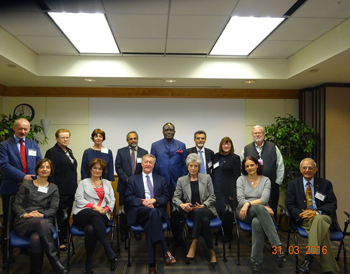
The Council for Higher Education Accreditation/International Quality Group (CHEA/CIQG) and the International Institute for Educational Planning (IIEP) of the United Nations Educational, Scientific and Cultural Organization (UNESCO) hosted a two-day expert meeting to address quality assurance, accreditation and the role they play in combating academic corruption.
AACRAO IES Director Dale Gough attended the meeting, held March 30-31, 2016, in Washington, DC, which brought together representatives from accrediting and quality assurance (QA) bodies, colleges and universities and higher education associations in Asia, Africa, Europe and North America. Co-chairs of the meeting were Sir John Daniel, Chair of the United World Colleges International Board, and Muriel Poisson, Head of the Research and Development Team, IIEP-UNESCO.
For the purposes of the meeting, “academic corruption” was defined as any prescribed action in connection with admissions, examinations or degree awarding that attempts to gain unfair advantage, including cheating, plagiarism, falsification of research, degree mills and accreditation mills.
Topics addressed included the background and history of academic corruption in higher education; an overview of quality assurance and its current role in addressing and combating academic corruption; and key questions to be considered in developing an advisory on the issue of academic corruption, including 1) whether existing codes of good practice are sufficient to make QA agencies resilient against corruption, 2) how QA agencies and higher education institutions can best work together to prevent academic corruption and 3) whether QA agencies should work together with other stakeholders (government, student associations, oversight authorities and society) to prevent academic corporation.
“Corruption in higher education is an incredibly serious problem that many stakeholders are reluctant to face,” said Sir John Daniel. “We hope that our work will be a wake-up call.”
“Academic corruption in higher education implies distorted selection processes, the overall devaluation of degrees and underqualified professionals. It also has detrimental effects on ethics and values,” Muriel Poisson noted. “To restore trust, a comprehensive set of strategies needs to be developed. Making quality assurance ‘integrity sensitive’ is one of them.”
A joint CHEA/IIEP-UNESCO advisory statement on quality assurance, accreditation and academic corruption will be developed in the next several months.
“We are delighted to have been co-host of this important and productive expert meeting,” said CHEA President Judith Eaton. “Providing an international forum to address issues related to quality assurance internationally is an important focus for CIQG.”
# # #
The CHEA International Quality Group (CIQG) is a forum for colleges and universities, accrediting and quality assurance organizations, higher education associations, governments, businesses, foundations and individuals worldwide to address issues and challenges focused on quality and quality assurance in an international setting.
The International Institute for Educational Planning (IIEP), part of the United Nations Educational, Scientific and Cultural Organization (UNESCO), provides training in educational planning, cutting-edge research and in-country capacity development for educational bodies.